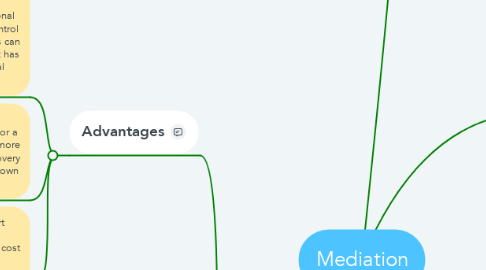
1. 5 Mediator Qualifications
1.1. Educational degree(s) and/or professional license(s) appropriate to applicant’s field of expertise.
1.2. A minimum of 10 years senior- level experience in business, industry or a profession.
1.3. Membership in at least one business, trade or professional association.
1.4. Training: Applicant must be able to document – by either a certificate of completion or a letter from the training organization—the completion of at least 24 total hours of training in mediation process skills encompassing the following topics: conflict theory, negotiation, dynamics of the mediation process, issues identification, generating options, caucusing, managing party interaction, ethics, impasse strategies, philosophies of mediation and mediator styles, role of the mediator, and simulated mediation role-plays providing performance-based evaluation.
1.5. B. Experience: Applicant must be able to document* ONE of the following: (i) Has served as a mediator on at least five mediation cases, in the applicant’s primary field of expertise, filed privately or through a court system over the last three calendar years. OR (ii) Has served informally in the role of a mediator on at least four different occasions over the last two calendar years (documentation required*). “Informal” mediations are defined as those that are privately arranged but not conducted under the auspices of an ADR provider or assigned through a court mediation program. Examples of informal mediations would be situations such as resolving disputes among business partners, employees or industry colleagues in the normal course of business.
2. Arbitration
2.1. Advantages
2.1.1. Fairness: Both parties agree to the arbitrator, resulting in a fair outcome, especially when compared to a traditional legal trial in which neither party has control over the jury or judge selection. Parties can also agree to choose an arbitrator that has experience in their specific area of legal dispute.
2.1.2. Timeliness: A legal resolution through arbitration is much quicker than waiting for a trial date. Arbitration is less formal and more flexible in terms of scheduling. The discovery process is a simple phone call, cutting down on much of the traditional trial process.
2.1.3. Cost: Arbitration does not include expert witnesses or require as much legal preparation. Both parties often split the cost of the arbitrator, meaning the process is much cheaper.
2.2. Disadvantages
2.2.1. No Appeals: The arbitration decision is final. There is no formal appeals process available. Even if one party feels that the outcome was unfair, unjust, or biased, they cannot appeal it
2.2.2. Rules of Evidence: A judge in a traditional court setting has specific regulations to follow when it comes to accepting evidence. Arbitrators, however, can utilize any information that is brought to them.
2.2.3. Lack of Consistency: There are no set standards for arbitration, making it difficult to find consistency. It is possible that an arbitrator can be biased, which is sometimes the case in mandatory arbitration contracts.
2.3. Qualifications
2.3.1. a. Minimum of 10 years of senior-level business or professional experience or legal practice. b. Educational degree(s) and/or professional license(s) appropriate to your field of expertise. c. Honors, awards and citations indicating leadership in your field. d. Training or experience in arbitration and/or other forms of dispute resolution. e. Membership in a professional association(s). f. Other relevant experience or accomplishments (e.g. published articles).
2.3.2. Reputation a. Held in the highest regard by peers for integrity, fairness and good judgment. b. Dedicated to upholding the AAA Code of Ethics for Arbitrators in Commercial Disputes and/or Model Standards of Conduct for Mediators.
2.3.3. Judicial Capacity a. Ability to manage the hearing process. b. Thorough and impartial evaluation of testimony and other evidence.
2.3.4. Commitment to ADR Process a. Willingness to devote time and effort when selected to serve. b. Willingness to support efforts of the AAA. c. Willingness to successfully complete training under the guidelines of the Commercial Arbitration Development Program.
2.3.5. Neutrality a. Freedom from bias and prejudice. b. Ability to evaluate and apply legal, business, or trade principles.
